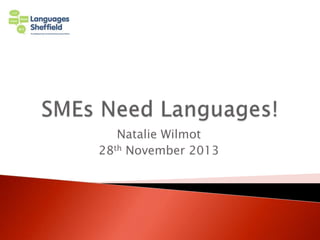
SMEs Need Languages!
- 1. Natalie Wilmot 28th November 2013
- 2. Personna PCL Cater Allen Private Bank, owned by Santander Riba Farré (Barcelona) Sheffield Hallam University
- 3. Globally, over two thirds of exporters have less than 20 employees (Daniels et al, 2013) ... Although a 2012 study suggested that 60% of SMEs questioned plan to begin trading in a new overseas market over next three years (Hagen et al, 2013) Currently in the UK, 64% of SMEs only trade domestically (Telegraph, 2013) 40 % of those questioned suggested they would need foreign language skills to help them achieve their goals (Hagen et al, 2013) In a poll of 500 UK SMEs only 6% said overseas trade was a key target for their business next year... (Telegraph, 2013) In the Sheffield City Region, 95% of employment is provided by just over 54,000 SMEs (FDI Intelligence, 2013)
- 4. Very High Impact Low Impact Limited information to locate/analyze markets Meeting export production quality standards/specs Inability to contact overseas customers Lack of excess production capacity for exports Identifying foreign business opportunities Verbal/nonverbal language differences Difficulty in matching competitors prices Excessive transportation/insurance costs Different foreign customer habits/attitudes Poor/deteriorating economic conditions abroad Political instability in foreign markets Leonidou, 2004
- 5. Very little! However it mainly focuses on survey data looking at which languages SMEs use and frequency Academic literature not particularly concerned with the topic There's a lot it doesn't tell us... Not really explored how it impacts on relationships in business, although Incelli (2008) suggests language is a barrier Some data exists...
- 6. Shows an interest in the culture and customer’s country, and often smooths the path of negotiation by facilitating social contacts Allows a relationship of trust to develop Improves the flow of communication both to and from the market Improves ability to understand the ethos and business practices of the market Improves ability to negotiate and adapt product and service offerings to meet the specific needs of the customer Gives a psychological advantage in selling Turnbull, 1981 cited in Swift, 1991
- 7. Language Control Policies Bridging Individuals Third Party Resources Lingua franca Language Nodes External language resources Functional multilinguism Selective Recruitment Machine translation Controlled language Expatriate Management Common corporate language Inpatriation Training Wilmot, 2013 based on Feely and Harzing, 2003
- 8. BELF is a neutral language (Kankaanranta and Louhiala-Salminen 2007) Grammatical correctness is not important, and it can be used to "get things done" It is owned by the international business community, not native speakers English cannot be viewed as a neutral language (Tietze, 2004) It is still bound up with power and is a form of hegemony (Pennycook, 2007)
- 9. 1 Spanish 2 Arabic 3 French 4 Mandarin Chinese 5 German 6 Portuguese 7 Italian 8= Russian 8= Turkish 10 Japanese British Council, 2013
- 10. “It felt like… half of our professional competence had been taken away when we had to use a language that was not our own native tongue. You felt like an idiot…” (Vaara et al, 2005:609) Lack of competence may cause loss of face (Kameda, 2005) Can be challenging to participate fully (Charles, 2007) Task oriented approach may cause "thin communication" (Bouchien de Groot, 2012) Code switching may be viewed as deviant behaviour
- 11. Poster on the Wall of Beijing Language and Cultural University, cited in British Council (2013)
- 12. Bouchien de Groot, E (2012) Personal Preference or Policy? Language choice in a European-based international organization, Corporate Communications: An International Journal, 17(3), 256-271 British Council (2013) Languages for the Future [online] available at http://www.britishcouncil.org/sites/britishcouncil.uk2/files/languages-for-the-future-report.pdf last accessed 27th November 2013 Charles, M (2007) Language Matters in Global Communication, Journal of business Communication, 44(3), 260-282 Daniels, JD, Radebaugh, LH and Sullivan, DP (2013) International Business: Environments and Operations, 14 th Edition. Pearson, Essex FDI Intelligence (2013) A Revival Made in Sheffield [online] available at http://www.fdiintelligence.com/Special-Reports/2013/SheffieldCity-Region2 last accessed 27th November 2013 Hagen, S, Angouri, J, Dippold, D and Aponte-Moreno, M (2013) ARCTIC: Assessing and Reviewing Cultural Transaction in International Companies [online] available at https://www.surrey.ac.uk/arctic/files/arctic_final_report.pdf last accessed 28th November 2013 Incelli, E (2008) Foreign language management in Lazio SMEs, Language Policy, 7(2), pp99-120 Kameda, N (2005) A research paradigm for international business communication, Corprate Communications: An International Journal, 10(2), 168-182 Kankaanranta, A and Louhiala-Salminen, L (2007) Business Communication in BELF, Business Communication Quarterly, 70(1), 55-59 Leonidou (2004) An Analysis of the Barriers Hindering Small Business Export Development, Journal of Small Business Management, 42(3), 279 – 302 Pennycook, A (2007) The Myth of English as an International Language, in Makoni, S and Pennycook, A (eds) Disinventing and Reconstituting Languages. Clevedon, Multilingual Matters Swift, JS (1991) Foreign Language Ability and International Marketing, European Journal of Marketing, 25(12), 36 -49 Telegraph (2013) Can British business double exports by 2020? [online] available at http://www.telegraph.co.uk/finance/economics/10439497/Can-British-business-double-exports-by-2020.html last accessed 28th November 2013 Tietze, S (2004) Spreading the Management Gospel – In English, Language and Intercultural Communication, 4(3) 175-189 Vaara, E, Tienari, J, Piekkari, R and Santti, R (2005) Language and the Circuits of Power in a Merging Multinational Corporation, Journal of Management Studies, 42:3, pp595-623 Wilmot, N (2013) Professional Identity and Language Competence: A Theoretical Framework for the Relationship. Paper presented at the 7th International GEM&L conference, Identities, Languages and Company Cultures: Cohesion through Diversity?, Marseille, 21-22 March. Unpublished